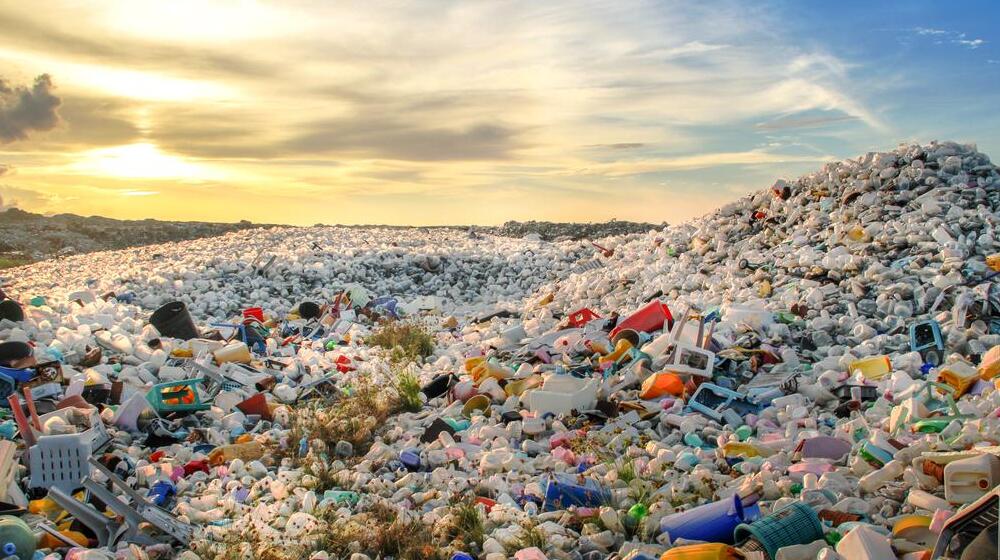Global Plastic Waste production doubled between 2009 and 2019 to 460 million tonnes and is projected to triple by 2060.
The grocery bags alone, if stacked, will go to the moon and back 5,790 times which should highlight the severity of the problem, and we may have a lot of time for analogies because it takes just 1,000 years for these bags to decompose.
Despite all the huge claims by the international community and big plastic producers, only 9 percent of the waste is recycled and most of that is reportedly being sent to developing countries in Asia and marked recycled while it ends up in a rich country’s landfill to a poor country’s landfill.
So, the problem statement is not new and this has resulted in the birth of several climate tech startups working out a recycling model that can be sustainable and scalable as well in addition to being you know recycling the plastic waste in the true sense.
What is Concept Loop?
“We are working in the space of sustainable building materials for nearly a decade, but we recently realized how plastic waste can be turned into one of a kind opportunity”, stated Dabeer Hemani, co-founder of Concept Loop talking exclusively to ProPakistani.
He said that plastic waste is not going anywhere, and traditional building materials are degraded quickly so Concept Loop is aiming to solve both of these problems through its solutions which include making paver blocks for footpaths and walk-in areas, decorative sheets, and partition boards using recycled plastic.
It’s primarily focusing on the circularity of ‘non-recyclable’ low-value multi-layers plastics and others. In the long run, it cannot just save the communities exposed to and living in proximity to dumping fields where it is burnt, but it can also provide employment to the invisible and informal sector that collects and sort the plastic waste.
Concept Loop claims to offset 20,000 kg of plastic with 69,000 kgs of environmental savings to date and aims to take the figures up to 170,000 kgs and 589,000 kgs respectively by year’s end.
But establishing a successful plastic recycling setup in a third-world country is not so simple. We are not sure if or when this technology will be available commercially or how viable it will be since they have not disclosed the pricing. It is working on paver blocks used for footpaths and parking places and planning to commercialize only that for now but other products like partition boards and decorative sheets are also at different stages of development.
“Current pricing will be at a slight premium than existing market products with similar strength required. As we scale up and add more efficient infrastructures, our pricing will be similar to or lower than traditional market available products,” added Hemani.
Even in developed countries like the United States, both the government and the big oil are pushing billions of dollars in investments in recycling infrastructure only to be called ‘a big lie’ by multiple studies because underlying unit economics do not make sense, yet.
Fact and Fiction Around Plastic Recycling Technologies
Nearly a dozen plastic recycling technologies are being practiced globally ranging from conventional chemical and mechanical recycling to organic recycling (through microbes), monomer recycling (breaking into smaller units to make virgin plastic), and using IoT sensors and robotics to automate the time-consuming operations of gathering and sorting. But none of these has been able to capture the market significantly.
Enzymatic recycling is also in the works with a French biotech company Carbios developing enzymatic technology that can recover 95 percent of the material from the Polyethylene terephthalate (PET), a common plastic used in beverage bottles and packaging but it may represent its own challenges substrate specificity of enzymes and requiring highly optimized environments.
Recycling startups have raised $2.5 billion over the years according to the Crunchbase data and although the venture funding has taken a reverse gear in the last year and a half, things are expected to be back to normal in 2024 with the global economic recovery, but the question is still the same.
Can technology and a new lot of founders fulfill this promise? Because people have gone weary of big oil and its failed commitments, and they are not alone.
In 2021, Reuters examined 30 recycling projects from two dozen companies on three continents and found all of them to be either operating on a modest scale or closed with half of them years behind previously announced commercial plans while three companies that went public had their stock prices decline after their IPO.
Bumpy Road Ahead
Coming to Pakistan, if the masses at large were not already enough price sensitive, the construction industry is hit by a historical price hike in recent years. On top of that, except few multinationals which have an international clientele, there are no incentives for the private sector to change its business model and tilt more towards sustainability.
“People are not willing to pay ‘green premiums’ yet for sustainable alternatives at the moment, so we pivoted towards the bottom of the pyramid plastics to lower cost and work out on profitable unit economics” acknowledged Hemani. He also revealed that over time, they developed their own localized machines to reduce dependence on imports and now an estimated 95 percent of their materials and chemicals are sourced locally.
He added that their patent request is in the works and acknowledged that this space is scattered at the moment and more needs to be done to grow it together as an ecosystem rather than a few companies monopolizing it for good.
Talking about the incentives, Hemani admitted that the current absence and importance of government support to raise the industry and added that although few legislations in Punjab to ban plastic bags and the recent Extended Plastic Responsibility (EPR) Act are encouraging they are too minute for the scale of the problem.
Pakistan’s annual plastic waste generation is around 3 million tons while Punjab alone accounts for nearly 1.22 million tonnes. But the plastic recycling rate in the biggest province is just 19.2 percent and that too clustered in the big cities i.e., Lahore, Sialkot, Bahawalpur, Rawalpindi, and Gujrat.
Let’s say a company comes up with a proprietary technology to fix this problem with a scalable business model, there are no strict IP laws or trusted legal bodies which would be able to enforce those laws.
The enforcement of IP laws is also critical because the circular economy vertical in Pakistan particularly in regard to building materials is rapidly getting competitive.
Lastly, the waste categorization and legal framework around it is non-existent so simply put, there is no value chain in Pakistan for recycling plastic into building materials or anything whatsoever at the moment. The whole industry is being built from scratch and that’s without any hard incentives or subsidies which is ambitious at the least.
Quest Should Continue
Despite all the challenges, Pakistan is way behind the developed world where they are at least attempting at bringing a change, and public awareness and purchasing power are higher to make these solutions commercially viable.
So, we need more of these startups and founders venturing into these technologies because the challenges are the price of innovation and no one gets anywhere without persistence. It’s easier in this day and age to do what Peter Thiel calls ‘horizontal or extensive progress’ by taking things that work somewhere to make them work everywhere.
But the innovation will come by pushing the boundaries of plastic recycling technologies and these efforts also fuel hope in a sustainable future where it will not only answer the environmental question but can also realize the circular economy that benefits us all.






















